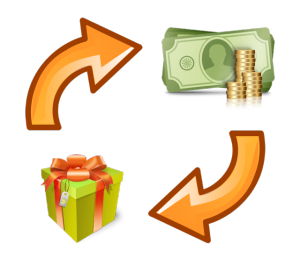 Yeah, I know the title of this post is cliché and overused. I really tried to come up with something more clever, but this title really does say it all.
Yeah, I know the title of this post is cliché and overused. I really tried to come up with something more clever, but this title really does say it all.
Last week I talked about how I create my wish list throughout the year. In that post, I mentioned that I bookmark “things that sound interesting but wouldn’t add any real value to my life at the moment I notice them.”
What about all that stuff that I feel would add value and, more importantly, how can I tell the difference?
Before I answer that, I want to be kind to some of my readers. If your goal is to go through life collecting “things,” and you’ve got the financial resources to do so, stop reading now. What I’m about to say won’t be of any interest to you.
Still with me? Good.
My test for something I’m considering buying is very simple: is it an asset or an expense?
Let me back up and define those terms. If you’ve read or heard anything from the Rich Dad company, you’ll be familiar with their practical definitions of these terms. If not, I highly suggest you pick up a copy of Rich Dad, Poor Dad (or any of the other books; I have them all). Regardless, I’m going to expand on the concept a bit.
For me, an asset is something that you buy with the express intent of it continually adding value to your life. Expenses are everything else you spend money on.
Robert Kiyosaki and the Rich Dad folks focus specifically on assets that produce income. That’s certainly a big category for me. It’s what drives me when I’m hunting for real estate investments. It’s on my mind when I’m hiring or buying equipment or services to automate some aspect of my business. In fact, it drives nearly every business purchase I make beyond the basic necessities.
But there are a lot of things in my life that add value over the long term, even though it may not be monetary.
Consider training and eduction. The most important asset I “own” is the three pound mass between my ears. The more I feed it, the more I can get out of it.
Along the same lines, I have a whole accounting category for “next steps.” I’m always planning for the future (it’s that serial part of being a serial entrepreneur). Kickstarter and Indiegogo are my best friends in this area. If you want to see into the future, especially with technology, they’re your crystal ball.
Relationships? Gifts involving more than one person are extra special because they add value for everyone involved.
The last one I’ll mention, and a big one on my list, is charity. One of the Rich Dad philosophies says to give away 10% of everything you make. Now we’re adding massive value to peoples’ lives that we don’t even know.
If you think you’re getting the concept, but still not sure how to distinguish an asset from an expense, simply ask yourself the following three questions before you buy?
- Will I even remember that I own this thing 6 months from now?
- If I were to move into a smaller space, would I take it with me?
- How much [money / time / value] will this provide for me over the next year?
Happy hunting!
